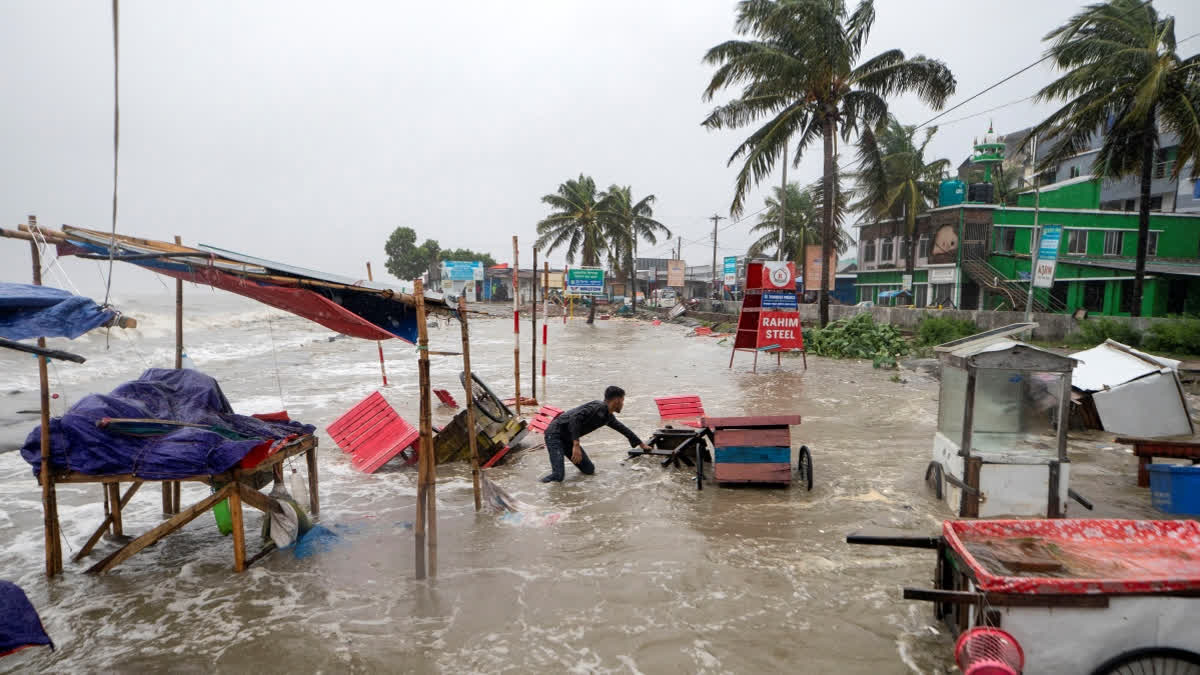Kolkata/Dhaka: The death toll in Cyclone Remal, the first major severe storm of the season this year, rose to 16 dead in Bangladesh and India as it made a landfall in Bangladesh’s coastal area on Sunday night.
In West Bengal, six people died as widespread devastation gripped coastal areas of the state on Monday, a day after the severe cyclonic storm made its landfall, unleashing winds up to 135 kilometres per hour. The cyclone wreaked havoc along the coasts of the state and Bangladesh, stretching from Sagar Island to Khepupara, near the southwest of Mongla in the neighbouring country.
SK Sajid, 48, a resident of Bibi Bagan died after a portion of his house collapsed and fell on him. Sajid went out in search of his son but was hit by the cornice when he returned home. He was taken to NRS hospital where the doctors declared him brought dead.
An eldery woman in the Mousuni Island near Namkhana adjacent to the Sunderbans delta also succumbed to injuries on Monday morning, following a tree collapse on her hut that resulted in the roof caving in, the official said.
The landfall, commencing at 8:30 pm on Sunday, inflicted extensive damage to infrastructure and property. The aftermath of 'Remal' revealed roofs torn off thatched huts, trees uprooted, and electric poles toppled, causing significant disruptions across various parts of the state, including Kolkata.
Reports of waterlogging added to the misery of affected residents as heavy rains persisted into Monday morning, inundating homes and farmlands. Incidents of injuries surfaced, with one person in the Gosaba area of the Sundarbans injured by debris and another hurt in Kolkata's Bibir Bagan area due to a collapsing wall amidst relentless downpour.
The West Bengal government evacuated over one lakh people from vulnerable areas ahead of the cyclone's landfall. This effort was focused primarily in the South 24 Parganas district, including Sagar Island, Sundarbans and Kakdwip. Districts such as North and South 24 Parganas and East Midnapore reported widespread damage.
Digha, a coastal resort town, witnessed tidal waves breaching a seawall, engulfing fishing boats, houses, and farmlands. Despite ongoing efforts to restore normalcy, including clearing debris and restoring power, the relentless heavy rains continue to hamper operations.
The full extent of the damage is still being assessed, but preliminary reports indicate a prolonged recovery process from this devastating natural disaster. The state government has mobilized relief measures, providing essential supplies such as food, drinking water, and medical assistance to affected populations.
Authorities are urging residents to remain indoors and take necessary precautions amid the persistent heavy rains. Districts in the southern part of the state recorded light to moderate rainfall, with Sagar Island in South 24 Parganas receiving 68.4 mm and Kanthi in Purba Medinipur district 58 mm in the 24 hours till 5.30 pm on Sunday.
To aid in relief efforts, fourteen National Disaster Response Force (NDRF) teams were deployed across affected districts in South Bengal, along with State Disaster Response Force (SDRF) teams and trained civil defense volunteers.
Disruptions in transportation were evident, with air, rail, and road services severely affected in Kolkata and other parts of southern Bengal. The Eastern and South Eastern Railways cancelled several trains for Sunday and Monday, while flight operations at Kolkata airport remained suspended for 21 hours from Sunday noon, affecting a total of 394 flights across international and domestic sectors.
Moreover, 150,457 houses were damaged during the storm. Among these, 35,483 houses were fully damaged in 107 unions and 914 municipalities of Bangladesh, according to state minister. He spoke about the damage caused by cyclonic storm Remal during the press briefing held at the Secretariat on Monday.
Severe impact in Bangladesh
A total of 9424 shelters have been opened in the coastal districts of Bangladesh and more than 800,000 people took shelter there. In addition, 52,146 domestic animals were also housed there. He further said that no major damage occurred due to measures taken by the ministry as per the directives issued by Bangladesh Prime Minister Sheikh Hasina.
Meanwhile, a total of 1,471 medical teams were constituted to provide treatment to the people in the cyclone-affected areas. Of these medical teams, 1,400 remain active, Dhaka Tribune reported.
According to the Bangladesh Meteorological Department, Cyclone Remal completed its landfall and weakened to a land depression over Bangladesh on Monday, Dhaka Tribune reported.
The deceased include three people in Bhola and Barisal districts each, and one each in Satkhira, Khulna, Chittagong and Patuakhali districts. Md Mohibbur Rahman said that 19 districts have been impacted during the storm which include – Jhalakathi, Barishal, Patuakhali, Pirojpur, Barguna, Khulna, Satkhira, Bagerhat, Barguna, Bhola, Feni, Cox’s Bazar, Chittagong, Noakhali, Laxmipur, Chandpur, Narail, Gopalganj, Shariatpur and Jessore.
The minister said that Tk 6.85 crore has been allocated to the affected people. He added that Tk 3.85 crore, 5,500 tons of rice, 5,000 dry foods, Tk1.50 crore for baby food and Tk1.50 crore for fodder have been provided in 15 districts.
Speaking about Sheikh Hasina’s visit’s to cyclone-affected regions, he said, “We have heard that and for this, contact was made with the Prime Minister’s Office. We will let you know when the program is finalised.”
Meanwhile, 10 international flights from Hazrat Shahjalal International Airport were cancelled due to the impact of Cyclone Remal and adverse weather conditions. In addition, the schedule of two flights was disrupted.
A flight returned after departure, and passengers from three flights were shifted to different flights. Hazrat Shahjalal International Airport Executive Director Group Captain Md Kamrul Islam shared details regarding the impact of Cyclone Remal on flights on Monday.
According to Dhaka Tribune report, he said 10 flights were cancelled due to inclement weather. Furthermore, there were cases of return and schedule collapse.
Read More



